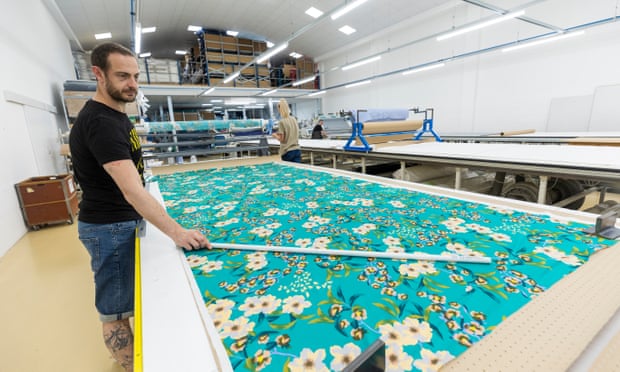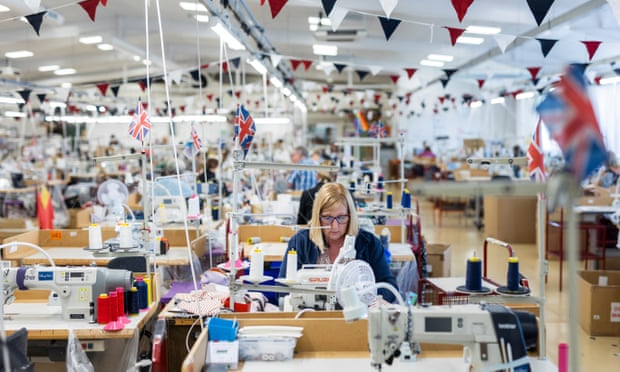On a hot summer’s day in Derbyshire, Christopher Nieper is worried about getting clothes from Shanghai to his factory in the former mining town of Alfreton.
For three months during the spring and early summer he had a container full of fabric stuck in the port of Shanghai while the Chinese city was on lockdown due to Covid. Eventually, not to wait any longer, he paid an extra €5,000 (£4,200) to have it airlifted, first to France and then to the East Midlands.
“I had customers who ordered in March saying, ‘Where’s my dress? I’ll have to cancel.”
Now owner David Nieper, the family business named after his father that has been making womenswear, knitwear and underwear in the city since 1961, is looking closer to home for his vital materials.
“You can turn three months into a week,” he says. “Think about the environment, saving the energy needed to bring something like that around the world. Think of the time saved, the waste avoided, the customer satisfaction.”
In response to severe disruption caused by Covid-19 lockdowns in China and Russia’s invasion of Ukraine, more than a third of UK manufacturers have increased the number of suppliers they use, according to a survey by industry group Make UK . More than three quarters of these companies are increasing their use of UK suppliers.
“The seismic shocks of recent years have created a powerful cocktail of factors that have turned business models upside down,” says Verity Davidge, director of policy at the manufacturers’ body. “For many companies this means leaving behind ‘just in time’ and embracing ‘just in case.’
However, the trend is far from straightforward, with questions over higher production costs and Britain’s capacity to meet rising demand after decades of industrial decline and underinvestment. For many firms – particularly those with large markets on the other side of the globe – turning to UK suppliers will make little sense.
“Companies need to be sure they are maintaining product quality, availability and cost requirements by being close to their customers and suppliers,” adds Davidge.
“Textile skills have almost disappeared from Western Europe,” says Nieper. “The reason more penetration hasn’t happened is that there are no factories left on the ground.”
As firms across Britain struggle with rising inflation, trade disruptions and severe staff shortages, the clothesmaker’s boss is taking matters into his own hands with a new bid to fix the country’s supply constraints. Or at least Alfreton’s.
Nieper has thrown his weight behind the local school, hoping to invest in a future generation of workers as one of the few business backers of an academy in Britain. Renamed the David Nieper Academy in 2016, the school once ranked among the worst in the country has grown to become the sixth most oversubscribed in Derbyshire, with almost 800 students.
As with the JCB Academy in neighboring Staffordshire – supported by the digger maker and other businesses including Bentley Motors, Network Rail and Rolls-Royce – the idea is that closer links with education could help British industry grow.
“Everyone complains saying, ‘You can’t get workers.’ Well, they just have to go ahead and do something about it,” says Nieper. He admits that getting businesses involved in education can be controversial (“The city was skeptical. What’s a private employer doing?”), but says supporting the school is one way to help boost the local economy.
“If one generation of children fails, the economy of a city will collapse. It’s a slow burn as they grow up if it’s not fixed,” he says, describing Alfreton as a “classic forgotten town”, where children tend to want to leave when they grow up. “If one school fails for 10 years, it will affect the whole economy, leaving people with low educational attainment and low aspirations.”
More progress needs to be made. The school received a “requires improvement” rating from Ofsted in its most recent inspection in May 2019 – although it won praise for the “hard work” of its headteacher, Kathryn Hobbs.
“Kids may not have the opportunities they have in other areas, but it’s our job to make it happen,” says Hobbs, who grew up near Alfreton but was one of many who left. She returned to take on the challenge of returning to school.
Textiles once formed the backbone of the industrial revolution, with former mining and mill towns such as Alfreton at the heart of the industry. Today, however, only 3% of the clothes worn in Britain are produced domestically. With globalization enabling manufacturing to be offshored, and amid a shift in advanced economies towards service sector activity, UK manufacturing has shrunk from more than a quarter of the economy in the 1970s to around 10% today.
The idea that Britain no longer makes things was one of the many reasons former industrial cities voted overwhelmingly for Brexit. Spying an opportunity, Boris Johnson visited David Nieper’s factory in 2016 on the Brexit campaign trail, using it to put together a Vote Leave banner at the workshop. He joked that the EU is a “badly designed undergarment” and said: “Hello to all those who despise Britain”.
UK exports to the EU fell by 40% in the first month after Johnson’s deal was introduced. Despite a recovery, the country’s trade performance still lags behind comparable advanced economies. Hardly supporting British manufacturing, post-Brexit border problems and red tape are driving up costs for businesses, while tougher migration rules have worsened labor shortages.

On a walk around David Nieper’s factory sites, located across Alfreton, there are few non-English voices to be heard. Nieper says there are some Polish and Lithuanian workers, while there are three Ukrainian refugees now at the school. He is proud to employ a largely native-born workforce. “It’s much better if you can grow the economy from within the city.”
Nieper has faced disruption and higher costs since Brexit, but its boss says sales in France and Germany remain strong. Because its products are made in Britain, they qualify for zero-tariff status when sold in the EU, unlike the garments originally made in Asia that many rivals export. Most British retailers, however, sell clothing made overseas, leading to a collapse of UK clothing exports to the EU.
“With Brexit it’s been difficult to get supplies. With Covid and now with the supply chain issues you can’t get anything in, so we decided to bring it in-house,” explains Nieper.
Despite his optimism, major retailers are skeptical about the chances of a widespread return to all-domestic supply chains. Nieper may be able to sell dresses for around £150 each – reflecting higher wages and production costs than abroad – to a largely older and affluent demographic. But it will not be affordable for everyone.
Archie Norman, chairman of Marks & Spencer, told the high street giant’s annual shareholder meeting that he would like to source more products from the UK, but “really we have to be cost competitive and we’ve lost the skills” to produce locally . On a large scale I don’t think we will see [British clothing manufacturing] soon,” he said.
With the uncertainty of Brexit, the coronavirus pandemic and political chaos at the heart of government, business investment of the kind required to boost the supply capacity of the UK’s industrial base is down. Spending remains 10% below pre-Covid levels. The government’s independent economic forecaster estimates there will be a 2% long-term hit to manufacturing capacity from Brexit.

Nieper believes more companies need to get serious about investing in Britain to counter these headwinds. He is also critical of M&S for being part of the problem, having stripped its supply chain in recent decades to match fast fashion competitors. Such movements had a major impact on the Midlands and the north of England, historically the home of the textile industry.
“When they went offshore, those factories closed and everything else fell like a pack of cards.”
Things may be starting to change. M&S is trialling production of some of its Jaeger brand clothes in the UK, while most of the furniture it sells is made in Wales and half of its beauty label products are made locally.
Consumers are becoming more aware of the environmental and ethical consequences of fast fashion. The industry’s carbon footprint is huge, with Oxfam estimating that the production of all the denim owned in Britain was responsible for the equivalent carbon emissions of flying a plane around the world more than 2,300 times.
While the redistribution could cut air miles and help British industry, there are concerns that Britain’s typically higher manufacturing costs could mean higher prices or less choice for hard-pressed consumers.
It’s a challenge Nieper says must be overcome. “The secret to us becoming a more prosperous nation is to start adding value [through more manufacturing]. But we need a massive retraining.
“You have to take it slowly. It will not happen in one step. But if we remove them all it would help the country in general.”




